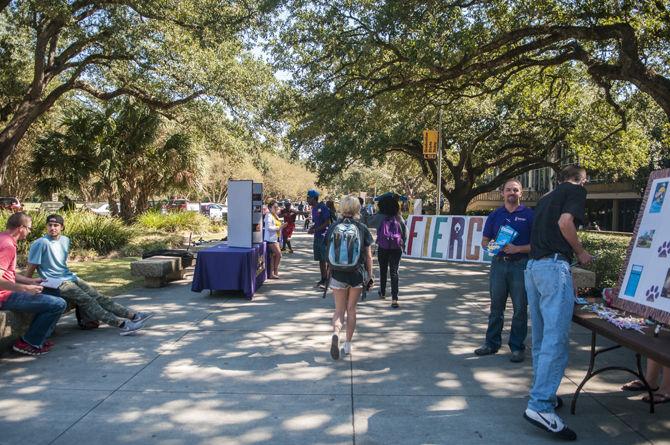Campus life without students is hardly a life at all. The buildings and spaces that define the University are nearly empty. Online courses and CDC guidelines have made the University devoid of the excitement and buzz generated by the 30,000 students that generally populate the campus. Every aspect of life for students has changed, and almost every aspect of the University has changed.
Businesses around the world are going through drastic hardships as the stay at home orders and self-quarantine practices continue. Organizations on campus are feeling these hardships as well. Student organizations often use the spring semester as a time for rebuilding and planning for the fall. Recruitment efforts, philanthropic events, scheduled meetings and events of all kinds are being put on hold.
New clubs and groups that are trying to find a foothold in campus life are at risk of being lost. Student organizations are often supported entirely by the students on campus who run them and many will not be able to survive without key members playing essential roles.
If social distancing measures continue into the fall like some experts predict, then student organizations across campus will be drastically affected and some will cease to exist. Only a handful of organizations have enough structure in place to survive a year without regular activities outside of the campus stalwarts that have solidified their place on campus for the near future.
Student Government and LSU Ambassadors will be fine when everything returns to normal, but some clubs do not have the luxury of name recognition and preexisting organizational structure. Organizations like the Karate Club, Quidditch Club and Tabletop Games Club are likely to lose members to graduation and won’t have the ability to recruit interested students in the upcoming fall semester.
As a member of several student organizations, I understand this pain. The responsibility placed on club officers has increased as we struggle to fulfill the duties of our position along with school work and coping with life during a global pandemic. Some organizational responsibilities have become virtually impossible, as table-sits in Free Speech Plaza have come to a halt and new people aren’t just walking around on campus. The role of new member recruitment and education must take on a different face for students who have shifted their campus existence online.
There is a necessary element of change required; the ability to adapt and change has never been more valuable for student leaders attempting to continue the hard work they have put into student organizations across campus.
Some groups have adapted quicker than others. Local NAACP chapters at several universities around the state have done an excellent job at connecting from afar. President of the LSU NAACP chapter, Jaylon Wingfield, assisted in organizing Zoom meetings with members from multiple schools as a way to keep their groups active and engaged.
Challenges lie ahead as we all figure out a sense of normalcy. Everyone must make changes if they want to survive, and student organizations are no exception. The nature of this crisis is inherently uncertain and adapting is no easy task. Some clubs will not exist when life returns to normal and others may flourish in exciting new ways.
Social connection is so much of what makes us human. The power of relationships can be felt now more than ever as we lose so many of the connections that sustained our daily lives. Student organizations and clubs play an essential role as a type of social catalyst, creating spaces where friendships can be formed and developed.
Student leaders must step up and ensure the survival of their organizations. Our University is not simply defined by the buildings on the campus but by the people with whom we are connected. Student organizations are the lifeblood of the University and they must do their part to preserve the culture that makes the University special.
Cory Koch is a 21-year-old political science senior from Alexandria, Louisiana.







